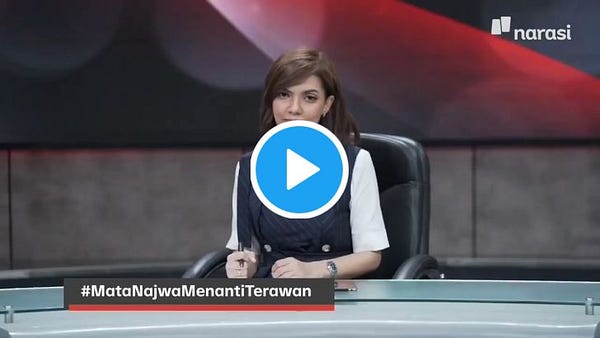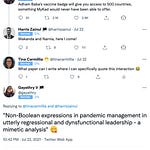Oh brother, Big Brother
Michel Martin for NPR: Trump joins Johnson and Bolsonaro in catching COVID-19. What have they learned? (Nothing.)
Justin Ong for Malay Mail: Fury over high ed ministry’s last-minute move to delay university intake. Ordinary Malaysians and former ministers mobilised to assist affected students.
Jerry Choong for Malay Mail: Whole country affected because of special treatment for non-compliant politician returnees from Sabah. Malaysia recorded the highest cases of COVID over the weekend, 293 on October 4th, and 317 on October 3rd. The last time figures were so high was on June 4th, at 277.
Amplify
A typical standing set-up for my video chats.
Last week, Amplify, a Takeda-sponsored podcast series was launched. It was supposed to be a panel discussion on haemophilia at the world congress in KL but everything went virtual because of the pandemic and the forum turned into a seven-episode podcast miniseries. I was supposed to be moderating the panel discussion, and then I became the series presenter.
I privately joked about how it was like ‘karma’ for me because one of the first live talk sets I did as a producer was about pre-screening for incurable genetic diseases with my presenter at the time, Lee Chwi Lynn. After summarising the news, we had a discussion where I said I wouldn’t spend the extra money on elective tests, just the ones required.
But when it comes to live shows, you aren’t always listening to the whole programme from the start – sometimes, you turn the station on in the middle or towards the end of it. A haematologist who caught parts of the segment wrote in a very strongly worded email about how irresponsible it was for me, a health journalist, to influence the public not to do pre-screening tests because some diseases, such as thalassemia, should be screened since it can seriously affect pregnancy and cause complications. I became more careful with prefacing personal statements made on-air so that anyone catching it in the middle of a programme understands the context.
So today, five years later, I am here to fully atone for that. This project came with a lot of challenges, including technical issues in coordinating speakers from multiple timezones. However, the Takeda team and the UK agency that sought my service were an absolute pleasure to work with. I find the level of professionalism, especially around regulatory compliance and editorial independence to be exemplary, and can only hope that Malaysian science journalism can reach that standard consistently.
This will probably be the last podcasting I will be doing in a while. I always say I prefer producing over presenting a show, but I agreed to do this because I think about that email all the time, and I hope the doctor listens to this show and remembers me, and forgives me.
Listen to the first three episodes here.
What I read, watch and listen to…
I’m reading Indi Samarajiva on the overwhelming racism of COVID coverage:
Thailand worked hard and fought back COVID-19 with public health. Instead of seeing that, NYTimes asked if it was something in their blood. We’re talking about oriental blood magic, in 2020.
I’m watching Narasi TV’s Najwa Shihab interviewing an empty chair after Indonesia’s health minister Terawan Agus Putranto refused interview requests on his ministry’s handling of the pandemic.


I’m making light-sensitive light:
Chart of the week
Data journalist for The Economist, G Eliott Morris, reported a huge spike in American Google searches for moving to Canada after the US presidential debate night.
Fakta, Auta & Data #9: Sejarah pendek Akta Antiberita Tidak Benar
Pada bulan April 2018, kerajaan Barisan Nasional meluluskan Akta Antiberita Tidak Benar. Di bawah undang-undang ini, sesiapa yang didapati membuat atau berkongsi maklumat yang salah, atau sebahagiannya palsu, dengan niat jahat, boleh didenda sehingga RM500,000 atau dikenakan hukuman penjara maksimum enam tahun. Pembangkang menganggap undang-undang itu mengekang kebebasan suara menjelang pilihan raya umum.
Pada bulan Mei 2018, PRU diadakan. Pakatan Harapan berkempen untuk menghapuskan akta ini. Barisan Nasional kalah buat pertama kalinya dalam sejarah pilihan raya Malaysia. Kerajaan PH mula melaksanakan janji mereka.
Pada bulan Ogos 2018, Dewan Rakyat meluluskan rang undang-undang untuk memansuhkan akta ini. Namun, Dewan Negara, yang masih dikuasai oleh BN, menyekatnya sebulan kemudian. RUU itu kembali ke Dewan Rakyat untuk dibaca semula. Artikel 68(2) Perlembagaan Persekutuan menyatakan bahawa Dewan Negara hanya boleh menunda RUU selama setahun, ia tidak mempunyai kuasa untuk menolak RUU sepenuhnya. Tempoh itu adalah untuk memberi masa supaya sebarang pindaan boleh dibuat sekiranya diperlukan.
Apabila RUU itu kembali ke Dewan Rakyat pada Oktober 2019, ia menjalani semula proses pembentangan, pembahasan dan pelulusan. Dalam pusingan kedua, kalaupun Dewan Negara menolak RUU itu, Dewan Rakyat masih boleh mengemukakannya kepada Yang di-Pertuan Agong untuk diperkenankan. Yang di-Pertuan Agong mempunyai masa 30 hari untuk berbuat demikian, dan sekiranya tiada keputusan dibuat, ia masih menjadi sah secara automatik selepas tamat tempoh itu. Dewan Negara kali ini akur dan meluluskan RUU tersebut pada Disember 2019.
















